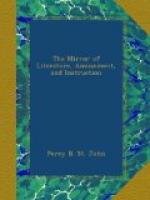I cannot suppose the reason given by your author for the discontinuance of the works at Colebrook-Dale to be correct, as there is another large furnace in the immediate neighbourhood, called “Madeley Wood Furnace” (also belonging to Mr. Reynolds’s family), which was allowed to make, and, I believe, still makes, the best iron and steel in the United Kingdom. Mr. Reynolds had also other great iron-works at Ketley, since carried on by his two sons, William and Joseph, and still in high reputation, as to the quality of the iron made there; these are not more distant from Colebrook-Dale than six or seven miles, and between the two there are the extensive and highly valuable works of “Old Park,” &c., belonging to Mr. Botfield (so that the whole district abounds in the materials), which not having the advantage of the immediate vicinity of the Severn for conveyance, would have been more likely to have stopped from the circumstances stated in your extract; viz. the failure in quality or quantity of iron-stone, coals, or other necessary matter. The Colebrook-Dale fires must, therefore, I conceive, have ceased to blaze, and the blast of her furnaces to roar, from some other cause, and from some private reason of her late proprietors.
Your constant reader,
Shrewsbury. SALOPIENSIS.
* * * * *
NOTES OF A READER.
TRAGEDY.
We do not see any necessary and natural connexion between death and the end of the third volume of a novel, or the conclusion of the fifth act of a play,—though that connexion in some modern novels, and in most English tragedies, seems to be assumed. Nor does it seem to follow, that, because death is the object of universal dread and aversion, and because terror is one of the objects of tragedy, death must, therefore, necessarily be represented; and not only so, but the more deaths the better. If it be true that familiarity has a tendency to create indifference, if not contempt, it must be considered prudent to have recourse to this strong exhibition as to drastic remedies in medicine, with caution and discrimination, and with a view to the continuance of its effect. We cannot help wishing that our own Shakspeare, who lays down such excellent rules for the guidance of actors, and cautions them so earnestly against “overstepping the modesty of nature,” and the danger of “tearing passion to rags,” had remembered, that the poet himself has certain limits imposed upon him, which he cannot transgress with impunity. We should not then have observed, in the perusal of some of his plays, the marginal notice of ["dies”] with about as much emotion as a note of exclamation; nor, when at the actual representation, we behold the few remaining persons of the drama scarcely able to cross the stage without stumbling over the bodies of their fallen companions, should we have felt our thoughts unavoidably wandering from the higher business and moral effect of the scene, to the mere physical and repelling images of fleshly mortality.—Edinburgh Rev.




